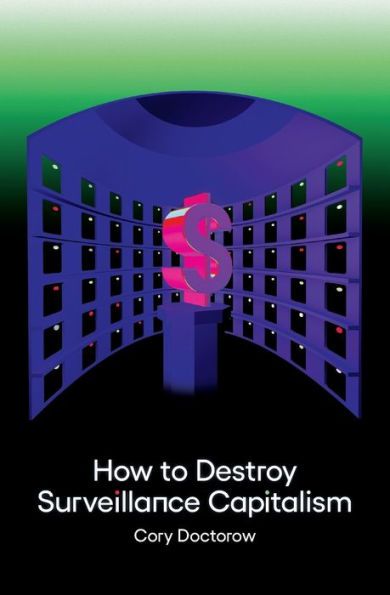
Today's Twitter threads (a Twitter thread).
Inside: A weapon of mass financial destruction; and more!
Archived at: pluralistic.net/2021/05/14/bil…
#Pluralistic
1/
Inside: A weapon of mass financial destruction; and more!
Archived at: pluralistic.net/2021/05/14/bil…
#Pluralistic
1/

Next Weds (5/19), I'm doing a talk called "Seize the Means of Computation," at the Ryerson Centre for Free Expression:
cfe.ryerson.ca/events/how-des…
And on Thu (5/20), I'm doing a keynote called "Privacy Without Monopoly," for the Northsec conference:
nsec.io/speaker/cory-d…
2/
cfe.ryerson.ca/events/how-des…
And on Thu (5/20), I'm doing a keynote called "Privacy Without Monopoly," for the Northsec conference:
nsec.io/speaker/cory-d…
2/
A weapon of mass financial destruction: Your pension is funding the destruction of the real economy...and itself.
3/
https://twitter.com/doctorow/status/1393239569248579586
3/
#5yrsago Infested: an itchy, fascinating natural history of the bed bug memex.craphound.com/2016/05/14/inf…
#5yrsago Banker implicated in one of history’s biggest frauds says boss beat him with a tiny baseball bat ibtimes.co.uk/barclays-banke…
4/
#5yrsago Banker implicated in one of history’s biggest frauds says boss beat him with a tiny baseball bat ibtimes.co.uk/barclays-banke…
4/

#1yrago Facebook's "backfire effect" junk science pluralistic.net/2020/05/14/eve…
#1yrago Restaurants won't let gig drivers pee pluralistic.net/2020/05/14/eve…
5/
#1yrago Restaurants won't let gig drivers pee pluralistic.net/2020/05/14/eve…
5/

#1yrago Facebook's "backfire effect" junk science pluralistic.net/2020/05/14/eve…
#1yrago Restaurants won't let gig drivers pee pluralistic.net/2020/05/14/eve…
6/
#1yrago Restaurants won't let gig drivers pee pluralistic.net/2020/05/14/eve…
6/

Yesterday's threads: The Democratic establishment; Uber (Ch)eats; and more!
7/
https://twitter.com/doctorow/status/1392885083443404801
7/

My latest novel is Attack Surface, a sequel to my bestselling Little Brother books. @washingtonpost called it "a political cyberthriller, vigorous, bold and savvy about the limits of revolution and resistance."
Get signed books from @darkdel: darkdel.com/store/p1840/Av…
8/
Get signed books from @darkdel: darkdel.com/store/p1840/Av…
8/
My book "How to Destroy Surveillance Capitalism" is a critique of Big Tech connecting conspiratorial thinking to the rise of tech monopolies (proposing a way to deal with both) is now out in paperback:
onezero.medium.com/how-to-destroy…
Signed copies here:
darkdel.com/store/p2024/Av…
9/
onezero.medium.com/how-to-destroy…
Signed copies here:
darkdel.com/store/p2024/Av…
9/

My ebooks and audiobooks (from @torbooks, @HoZ_Books, @mcsweeneys, and others) are for sale all over the net, but I sell 'em too, and when you buy 'em from me, I earn twice as much and you get books with no DRM and no license "agreements."
craphound.com/shop/
10/
craphound.com/shop/
10/

Upcoming appearances:
* Seize the Means of Computation, @RyersonCFE, May 19, cfe.ryerson.ca/events/how-des…
* Privacy Without Monopoly, @NorthSec_io , May 20, nsec.io/speaker/cory-d…
* In conversation with @ddayen (Second Life Book Club), Jun 4, draxtor.com/sl-book-club-c…
11/
* Seize the Means of Computation, @RyersonCFE, May 19, cfe.ryerson.ca/events/how-des…
* Privacy Without Monopoly, @NorthSec_io , May 20, nsec.io/speaker/cory-d…
* In conversation with @ddayen (Second Life Book Club), Jun 4, draxtor.com/sl-book-club-c…
11/

Recent appearances:
* @mamohanraj and @ben_rosenbaum Are Humans
open.spotify.com/episode/01dGJO…
* Can Antitrust Laws Destroy Surveillance Capitalism? (@majorityfm )
* In conversation with John @Scalzi at the @GburgBookFest
12/
* @mamohanraj and @ben_rosenbaum Are Humans
open.spotify.com/episode/01dGJO…
* Can Antitrust Laws Destroy Surveillance Capitalism? (@majorityfm )
* In conversation with John @Scalzi at the @GburgBookFest
12/

My first picture book is out! It's called Poesy the Monster Slayer and it's an epic tale of bedtime-refusal, toy-hacking and monster-hunting, illustrated by @mcrockefeller. It's the monster book I dreamt of reading to my own daughter.
pluralistic.net/2020/07/14/poe…
13/
pluralistic.net/2020/07/14/poe…
13/
You can also follow these posts as a daily blog at pluralistic.net: no ads, trackers, or data-collection!
Here's today's edition: pluralistic.net/2021/05/14/bil…
14/
Here's today's edition: pluralistic.net/2021/05/14/bil…
14/
If you're a @Medium subscriber, you can read these - as well as previews of upcoming magazine columns and early exclusives on doctorow.medium.com.
15/
15/
If you prefer a newsletter, subscribe to the plura-list, which is also ad- and tracker-free, and is utterly unadorned save a single daily emoji. Today's is "🤡". Suggestions solicited for future emojis!
Subscribe here: pluralistic.net/plura-list
16/
Subscribe here: pluralistic.net/plura-list
16/
Are you trying to wean yourself off Big Tech? Follow these threads on the #fediverse at @pluralistic@mamot.fr.
Here's today's edition: mamot.fr/@pluralistic/1…
17/
Here's today's edition: mamot.fr/@pluralistic/1…
17/
• • •
Missing some Tweet in this thread? You can try to
force a refresh










